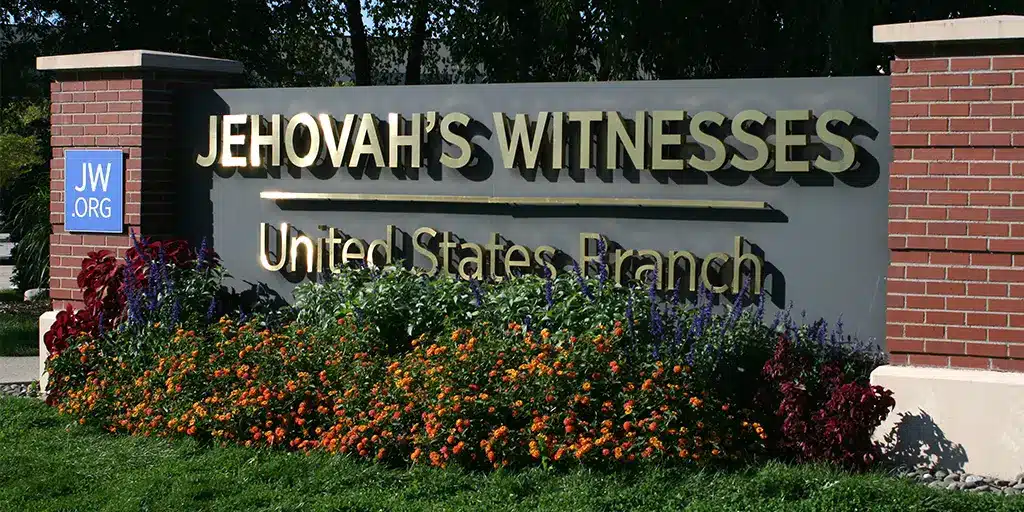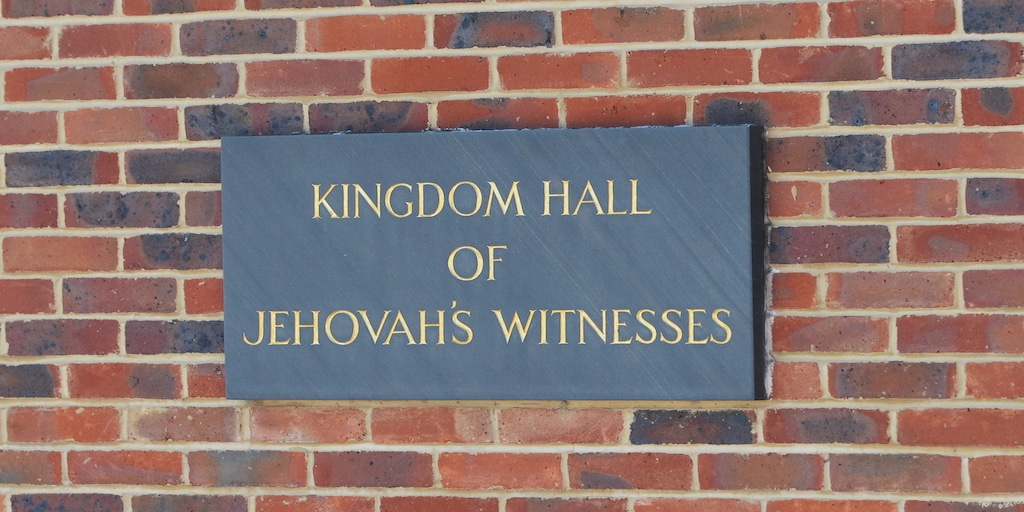The Watchtower Society

The Watchtower Society is a nineteenth century organization that governs Jehovah’s Witnesses worldwide. Witnesses believe that God Himself established this organization to represent Him on earth. They claim that the true understanding of the Bible can only be gained through the teachings of the Watchtower. The organization’s extensive literature is considered essential to the correct interpretation of Scripture. Jehovah’s Witnesses are repeatedly reminded of this.
Jehovah’s Witnesses strongly believe in the exclusivity of the Watchtower Society and consider it to be the only source of God’s truth. They view other Christian organizations as deceptive and under the influence of the devil. They believe that reading the Bible alone is not enough to gain the knowledge of God. In order to progress spiritually, one must be in contact with the Watchtower Society. Witnesses are expected to follow the Society’s guidance as if it were the voice of God. Not surprisingly, Watchtower literature consistently emphasizes the importance of depending on the Society for a proper understanding of the Bible.
If a Jehovah’s Witness disobeys the instructions of the Watchtower Society, even in a minor way, he is considered an “apostate” and faces the consequence of being “disfellowshiped.” Individuals in good standing with the Watchtower Society are not permitted to have any interaction or conversation with someone who has been disfellowshiped. The only exception to this rule is if the disfellowshiped person is a close family member, such as a spouse, in which case it is acceptable to engage in necessary dealings with them. This fear of being disfellowshipped serves as one of the Watchtower’s most effective methods of ensuring unwavering obedience to its teachings.
A Christian Assessment
While Jehovah’s Witnesses make various claims to support their view of the Watchtower Society, these claims can be easily refuted from a biblical standpoint:
The “Voice of God.” Jehovah’s Witnesses insist that the Watchtower Society is God’s visible representative on earth and should be obeyed as the voice of God. Biblically, however, the “voice of God” is found only in the Scriptures (2 Timothy 3:16; 1 Corinthians 2:13). Obedience should be rendered to God and His Word (Psalm 119), not to an eighteenth-century organization.
Jehovah’s Witnesses argue that Scripture alone is insufficient for understanding God’s teachings. However, the Bible itself declares that Scripture is fully capable of providing the knowledge necessary for salvation through faith in Jesus Christ and for spiritual growth (2 Timothy 3:15-17).
Jehovah’s Witnesses claim that without the Watchtower Society and its extensive literature, people are completely incapable of discerning the true meaning of Scripture. However, the Bible clearly indicates that every person has the ability to understand Scripture, even from an early age (2 Timothy 3:15-17). Believers are aided toward this end by the Holy Spirit who helps us to understand and apply God’s Word (John 16:12-15; 2 Corinthians 2:9-12).
Jehovah’s Witnesses claim that people should not think for themselves in interpreting Scripture, but rather should submit their minds to the Watchtower Society. However, Scripture urges believers to evaluate all truth claims using Scripture as the standard (1 Thessalonians 5:21), as demonstrated by the Berean Christians (Acts 17:11). Jesus Himself consistently turned to Scripture as the ultimate authority (Matthew 4:4, 7, 10).
Multiple False Prophecies. Jehovah’s Witnesses argue that the Watchtower Society is a prophet of God. However, it is obvious that the Watchtower Society cannot be considered a true prophet because it has consistently made false predictions throughout its existence. According to the biblical criteria found in Deuteronomy 18:22, a true prophet should have an impeccable track record of accuracy—that is, a 100-percent accuracy rate. The Watchtower Society has woefully failed this test by making numerous false prophecies. Some notable examples of their false prophecies include:
- The Watchtower Society foretold that in the year 1914, all human governments would be overthrown, and Jehovah would establish His kingdom on earth.
- The Watchtower Society foretold that in 1925 Abraham, Isaac, and Jacob would rise from the grave and take residence in San Diego.
- The Watchtower Society foretold that the year 1975 would mark the end of human history and the establishment of God’s kingdom.
Mistakes Among the Prophets. Jehovah’s Witnesses defend the Watchtower Society against claims of being a false prophet by pointing out that even biblical prophets made mistakes and were not condemned for it. One such example is Jonah, who incorrectly predicted the destruction of Nineveh (Jonah 3:4-10; 4:1-2). Despite his error, Jonah was not deemed a false prophet. Therefore, the Watchtower Society should not be labeled as a false prophet for its own prophetic errors.
A closer examination of the Bible refutes the claims of Jehovah’s Witnesses that Jonah made a mistake. In fact, Jonah faithfully relayed exactly what God had commanded him to say to the people of Nineveh (Jonah 3:1). Since God is incapable of making mistakes (Hebrews 6:18; Titus 1:2), Jonah’s proclamation cannot be considered a false prophecy. It is clear that Jonah’s warning to Nineveh was conditional: “Unless you repent, God will bring destruction upon you.” The execution of this judgment was therefore dependent on Nineveh’s repentance, as evidenced by their repentant response (see 3:5), as well as Jonah’s self-centered admission that he feared from the beginning that the Ninevites would repent and be saved by God (Jonah 4:2).
God’s allowance of repentance in the face of impending judgment is stated as a principle in Jeremiah 18:7-8: “If at any time I announce that a nation or kingdom is to be uprooted, torn down and destroyed, and if that nation I warned repents of its evil, then I will relent and not inflict on it the disaster I had planned.” This principle is illustrated in the case of Nineveh. Hence, Jonah’s prophecy cannot be used to diminish the culpability of the Watchtower Society in its numerous false predictions. In biblical times, prophets were expected to be 100-percent accurate (Deuteronomy 18:22). If a prophet made a false prophecy, they would be put to death by stoning! Emphasize this fact to the Jehovah’s Witness.
Mistakes Among the Disciples. Jehovah’s Witnesses then present a similar argument to the one mentioned above. They claim that sometimes the disciples, being mere human beings, made mistakes when speaking. Therefore, they argue that we should give the Watchtower some leniency when it comes to making mistakes. However, this line of reasoning overlooks the fact that when the apostles or prophets spoke as God’s mouthpieces, they were incapable of making error. This is because they were conveying direct revelation from God Himself (Deuteronomy 18:18; 2 Samuel 23:2; 1 Corinthians 2:13).
An Apology for False Prophecies. Recently, there has been a change in approach by Jehovah’s Witnesses. They have begun to offer heartfelt apologies for the Watchtower’s prophetic errors in order to deflect further criticism. Along with the apology, they ask, “Will you forgive us?” This puts Bible-believing Christians in a quandary. Saying, “Yes, I forgive you,” might send the message that they will no longer criticize the false prophecies of the Watchtower. On the other hand, saying “No, I don’t forgive you” is not in line with Christian values. So here’s how I deal with it. I say, “Of course I forgive you. But I still have to ask, ‘Where in Scripture does it say that apologizing for a false prophecy makes you no longer a false prophet?’ Scripture is clear on this point. A true biblical prophet must be entirely accurate.
Matthew 24:45-47. Another argument Jehovah’s Witnesses offer in support of the Watchtower Society is that the organization is the “faithful and discreet slave” mentioned by Jesus in Matthew 24:45-47. Other Christian organizations are said to be represented by the evil slave mentioned in verses 48-51.
Jehovah’s Witnesses are quite obviously reading their theology into the text of Scripture. In context, Jesus’ parable likens any follower of Jesus to a servant entrusted with the responsibility of managing their master’s household. The parable highlights two contrasting ways in which a disciple can fulfill this role—either faithfully or unfaithfully. The faithful servant diligently fulfills their duties and shows dedicated commitment, while the unfaithful one takes advantage of the master’s absence and mistreats fellow servants, indulging in selfish behavior. Jesus’ parable serves as a call to all Christians to be faithful in their service. Those who prove themselves faithful will be rewarded upon the Lord’s return. Seen in this light, it is evident that this passage does not refer to the Watchtower Society.
The absurdity of this interpretation comes into even clearer light with the following question: “Since the Watchtower Society is claimed to be God’s collective ‘faithful and discreet slave’ that alone guides people in their understanding of Scripture, and since this organization did not come into existence until the late-nineteenth century, does this mean God had no true representatives on earth for many centuries?” I’ve never heard a good answer to this question.
2 Peter 1:20-21. Jehovah’s Witnesses also appeal to 2 Peter 1:20-21, which tells us that there should be “no private interpretations” of the Bible. They assert that the true meaning of the Bible can only be provided by the Watchtower Society.
Jehovah’s Witnesses are reading something into the text that simply is not there. Contrary to the Watchtower’s understanding, the Greek word for interpretation in this context literally means “unloosing.” We could rephrase the verse as follows: “No prophecy of Scripture is a result of one’s own unloosing.” In other words, the prophecies didn’t originate solely from the prophets themselves or from human imagination, but ultimately came from God, as verse 21 emphatically states. Therefore, this passage isn’t about how to interpret Scripture but rather about how Scripture was written.
Acts 8:30-31. Yet another verse frequently cited by Jehovah’s Witnesses to support their position is Acts 8:30-31. This passage tells the story of Philip, who aids an Ethiopian man in grasping the meaning of the Scriptures. Supporters claim that this scenario exemplifies the necessity of an organization to clarify the Bible’s content. According to their belief, the Watchtower serves as God’s designated organization for correctly interpreting the Scriptures.
It is indeed true that this passage suggests that sometimes people require guidance to comprehend Scripture. However, there is no trace of evidence in this passage to support the belief that an organization with infallible interpretations must be followed and adhered to by all true followers of God. In this passage, Philip (a man) directly taught an Ethiopian (another man) from Scripture—and he did so without using any materials created by an organization. Subsequently, the Ethiopian expressed his faith in Christ and underwent baptism (see Acts 8:34-38).
Doctrinal Reversals. Finally, it is evident that over the course of decades, the Watchtower Society has undergone significant changes in its stance on vital matters relating to life and death. This behavior seems particularly unlike a true prophet of God. For instance, in 1931, the Watchtower Society enforced a prohibition against vaccinations, a stance that was later abandoned in the 1950s. Similarly, in 1967, the organization proclaimed that organ transplants were akin to cannibalism and forbade Christians from engaging in such procedures. However, in the 1980s, Watchtower leaders had a change of heart and reversed their position, now permitting transplant surgeries. This does not sound like a prophet of God!
In light of the evidence presented in this article, it is evident that the Watchtower Society does not hold the status of a genuine prophet appointed by God.
Go Deeper
- Iran, Israel and End Time Events – 2 DVD’s 3 Books – Package Offer
- The End of America? – Book
- Can We Still Believe in the Rapture? – Book
- Northern Storm Rising – Book
~ ~ ~
If you’re seeking a comprehensive treatment of this subject, I invite you to dive into my 464-page book titled, Reasoning from the Scriptures with the Jehovah’s Witnesses (Harvest House Publishers).







